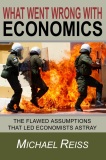The following article is thinking out loud...
How can it possibly be that some leading economists think we need to worry about deflation, while at the same time other leading economists think we need to worry about hyperinflation? The answer I believe is our damned fractional reserve banking system. The way it behaves is just so hard to understand. I believe this is fundamentally because it so poorly reflects the true nature of trade. Let me explain with a little thought experiment and some mathematics:
Imagine a "barter" system which had developed in the modern world. Imagine that all sorts of sophisticated transactions were arranged with the help of some I.T. and a good legal system such that you could have phenomena like lending and investment and all the "financial" interactions you'd expect in a capitalist system. You could envisage the flow of goods and services between people as a flow or vector field. This field would have both "sources" and "sinks". With the sources corresponding to the addition of value (e.g. assembling raw materials in to goods) and sinks corresponding to the loss of value (wearing out of goods).
The I.T. and the legal contracts would have to be very complex indeed to make this work and so people may want to introduce a system of "money" to simplify things. Now it seems obvious to me that the money system should as accurately as possible mirror the transactions that are going on in this barter system and an easy way to imagine this, is to consider that we have cash that simply flows in the opposite direction to the goods. You would have two equal and opposite vector fields. Unfortunately money can not do this precisely because it can not have sources and sinks in the same way as goods, but it would be a close approximation and money can always adjust its own value to make up for the minor discrepancies.
So why then have we ended up with this crazy fractional reserve banking system in which the total amount of money in the system can grow and shrink by a factor of ten!! In what way does that mirror the flow of trade?
I believe that the immense difficulties of understanding the world economy are largely due to this non-correspondence.
Wednesday, 1 July 2009
Subscribe to:
Post Comments (Atom)




No comments:
Post a Comment